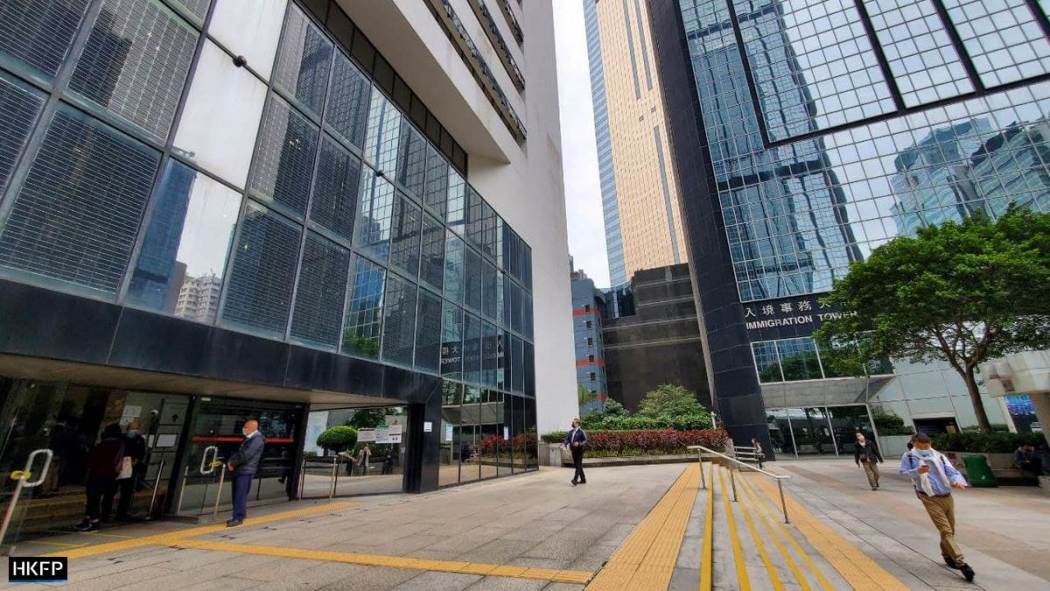A student activist who pushed for Hong Kong independence has been sentenced to three years and seven months after pleading guilty to secession, an offence under the Beijing-imposed national security law, and to money laundering.
The 20-year-old activist, the youngest person to be convicted under the law, said he pleaded guilty with “no shame in my heart” when he appeared in court about three weeks ago. The judge rebuked him for making a political declaration in court.

The former Studentlocalism convenor, who was previously given a four-month jail sentence for insulting the Chinese national flag, was arrested in October last year near the US consulate in Hong Kong, reportedly en route to seek asylum.
Explainer: Tony Chung – the first political figure arrested under Hong Kong’s security law
Chung had pleaded not guilty to two other charges, conspiracy to publish seditious materials and another count of money laundering. These charges were left on file under a plea bargain deal.
He was sentenced to three years and four months for the first charge of secession, and a year and a half for the second charge of money laundering, with three months served non concurrently, totalling 43 months.

When handing down the sentence, District Court Judge Stanley Chan said acts committed by Chung would place him in the second sentencing bracket of three to seven years under the national security law as an active participant of the crime. “Even though the defendant did not have concrete plans to split the country, his goal was very much clear. The [charge] of secession does not require actual plans,” Chan said.
“The defendant thought he could change the location for his activities to overseas, and therefore created [social media pages] for the US branch of [Studentlocalism],” he said. “While there was no evidence that Chan had wanted to enter the US consulate to demand their action, the fact is that he was arrested nearby.”
Chung was not granted a sentence reduction due to his belated admission of guilt, Chan said, but was given a 25 per cent reduction to what would otherwise be a four year sentence.
Studentlocalism
Before sentencing, Judge Chan asked prosecutors to clarify why Chung had been near the US consulate at the time of his arrest. The prosecutor said he was bound by the statement of facts as agreed in the plea deal but “there was no special or explicable reason,” as far as he could tell.
The judge also asked defence counsel Edwin Choy if there was any reason to believe that the defendant had spent any of the funds in connection with the money laundering charge for his personal use. Choy denied this, saying the funds were wired to Chung’s personal account because Studentlocalism had no business bank account. But prosecutors said there was evidence that not all of the funds were spent on the advocacy group.
“Some must have been pocketed, because it was a private account. In other words it’s just an ATM,” the judge said.

The defence lawyers urged the judge to consider a letter from Chung’s mother, explaining that he had a “somewhat turbulent” youth but remained a good son to his parents.
Chung was accused of publishing social media posts that called for the public to join protests, to “get rid of Chinese colonial rule,” as well as posts stating the mission and manifesto of his group.
At the last hearing the prosecutor accused Chung of managing Studentlocalism’s Facebook pages, and said social media posts and recruitment links were still operational after the enactment of the national security law on June 30, 2020.
The prosecutor also read out the names of donors who gave more than HK$1,000 to Chung’s PayPal accounts as well as messages accompanying the payments, such as “Keep it up” and “Hong Kong independence.”
On Tuesday, Chung was wearing glasses with a black plastic frames and a white shirt. He nodded at people in the public gallery, who waved at him as he entered the defendant’s dock and as he left. He responded with a slight bow as he exited.
At the end of the proceedings, Judge Chan announced that the court had reported previous threats of violence made against judges, adding that such acts would not be tolerated even in other countries. “The Gods see what men have done,” he said. “I hope when this man is arrested, he wouldn’t find excuses for himself. He should admit what he dared to do.”
Third jailed under security law
While secession is punishable by a maximum of life imprisonment, the maximum prison term the District Court can impose is seven years.

The national security law also criminalised subversion, collusion with foreign forces and terrorist acts, which were broadly defined to include disruption to transport and other infrastructure.
Chung was the third person to be jailed under the security law. Tong Ying-kit was the first person convicted under the legislation, for inciting secession and engaging in terrorist acts, and was sentenced to nine years in prison. Ma Chun-man, meanwhile, was given nearly six years in jail after being convicted of inciting secession.
Pro-democracy activist Andy Li and paralegal Chan Tsz-wah were the first people to admit to violating the sweeping legislation and are awaiting sentencing.
More to follow.
Support HKFP | Policies & Ethics | Error/typo? | Contact Us | Newsletter | Transparency & Annual Report | Apps
Help safeguard press freedom & keep HKFP free for all readers by supporting our team
























